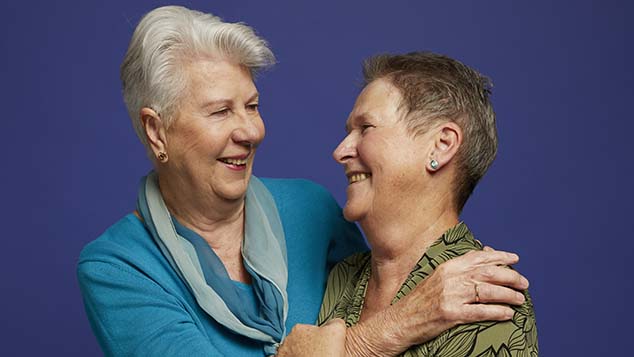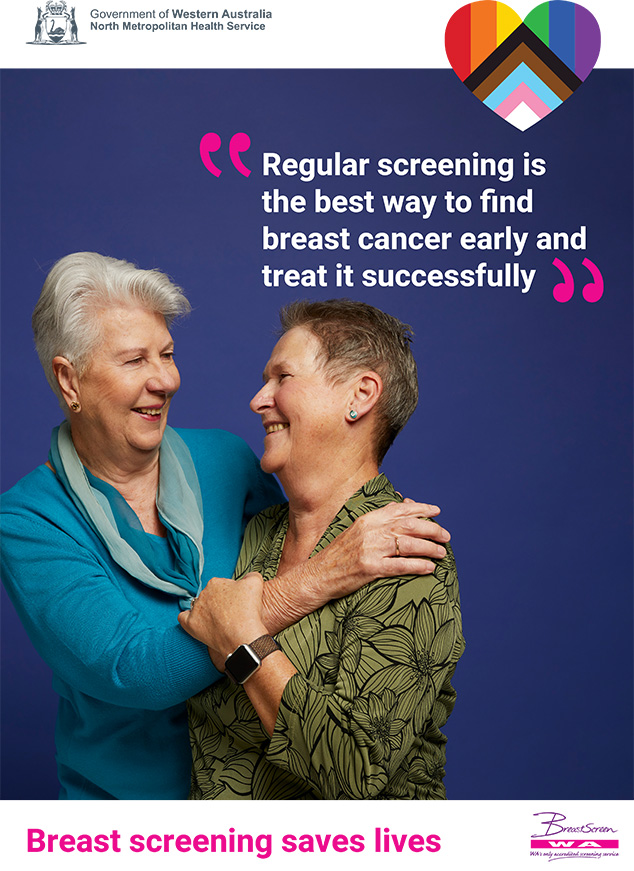
Local couple Geri Garland and Stephanie Mutch talk to OUTinPerth about why they signed up to be part of a campaign that encourages LGBTIQA+ people to engage with cancer screening programs.
The Screening Saves Lives campaign from North Metropolitan Health encourages people to get tested for bowel, cervical and breast cancer.
October is Breast Cancer Awareness month. Approximately 57 Australians are diagnosed with breast cancer every day. That equates to over 20,000 Australians diagnosed with breast cancer each year.
1 in 7 women will be diagnosed with breast cancer in their lifetime and most have no family history of the disease.
Less than 1% of all breast cancer is diagnosed in men.
Research has shown that LGBTIQA+ people are less likely than the general population to engage with health professionals, and the result of this is a lower level of early detection illnesses.
Geri shared that she volunteers at the Breast Cancer Assessment Clinic at the Royal Perth Hospital, and it was here that one of the staff members suggested that she and wife Stephanie would be perfect for the campaign.
When Gerri came home and put forward the idea, Stephanie says her first reaction was to declare she wasn’t very photogenic, but as it was a campaign to raise awareness about cancer she quickly agreed to take part.
Years ago Stephanie had precancerous cervical cells removed, and ever since she’s been vigilant in making sure she always gets all the required check-ups and scans.
Shortly after they completed their photoshoots Stephanie went for a routine breast scan that detected an abnormality.
“I had this breast screening, and they came back to me and said, ‘We need to follow up further.’ And I thought, ‘Oh, yeah, no problem. So I went along to Gerri’s Breast Assessment Clinic, had a biopsy, and it turned out to be cancerous.” Stephanie said.
Not long after she had an operation to remove the cancerous tissue, and also underwent intraoperative radiation treatment.
“So I didn’t need any radiation therapy afterwards, which was wonderful.” Stephanie said.
Shortly after her operation one of her first outings was to Pride’s Fairday celebrations in Hyde Park, and as she entered the grounds she saw a huge poster of her campaign photo encouraging people to get tested regularly.

“It is so important for every single person to go and get the tests that they’re meant to have.” Stephanie said.
“I was about 40 when I had a brush with pre-cancer. So I had cervical screening every year after that, which meant that I definitely went along to the mammograms. We do the poo tests, we do everything.” Stephanie said of the couple’s diligence to testing.
“Because it’s in our power to do that. And if you let things go, you can end up in all sorts of trouble, it’s so important.”
While testing for cervical and breast cancer requires a medical appointment, all Australians over 50 years of age receive the testing kit for bowel cancer in the mail. It just requires two tiny poo samples that are sent into the lab.
Geri said that people are often surprised to discover the couple have been together for over 26 years, sharing that they got married just a few months after the laws changed in 2018.
Asked what they think of their new roles as poster girls, Geri breaks into a laugh.
“We think it’s hilarious. Absolutely hilarious.”
Quick facts about Breast Cancer
- BreastScreen WA provides FREE screening mammograms to eligibleWestern Australians 40 years or over with no breast symptoms, every two years.
- The risk of breast cancer increases with age: over 75 per cent of breast cancers occur in women over 50 years of age.
- A screening mammogram can detect breast cancer before any changes can be seen or felt.
- Breast cancer cannot be prevented, but the earlier a breast cancer is detected the better the chance of successful treatment.
- BreastScreen WA encourages everyone to be breast aware, if you notice any unusual changes see your GP without delay.
Find out more about getting tested for Breast cancer at BreastScreen WA.
Graeme Watson, This article was created with the support of North Metropolitan Health.
You can support our work by subscribing to our Patreon
or contributing to our GoFundMe campaign.






